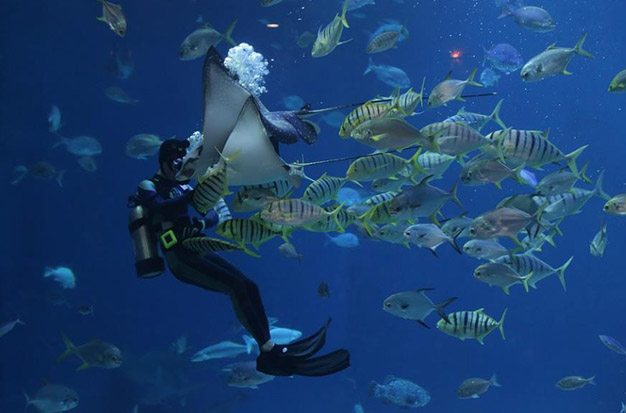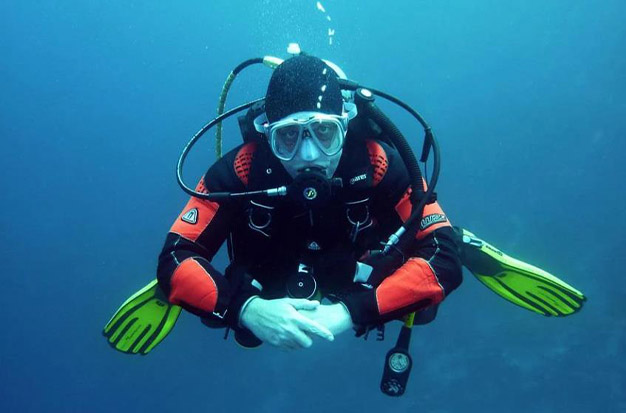Any amount of enjoyment is not worth the unwarranted risk of death! Divers are frequently seen in locations where recreational boaters launch and recover their vessels because diving is a popular sport.
It is more important than ever for boaters and divers to exercise extra caution to prevent injury as diving becomes more and more popular. Despite the fact that diving is a relatively safe sport, In a secure setting, learning and practicing are straightforward.
The vast majority of accidents involving diving are the result of negligence or diver error. As a result, it follows that we ought to focus our efforts on avoiding problems before they arise.
We should also develop problem-solving skills so that we can handle issues as they arise. So, let’s have a look at what should divers do for their own safety one safety before, during, and after a diving trip.
Table of Contents
What Are Diving’s Risks?
Decompression sickness, arterial air embolism, and other dangers are associated with scuba diving. As long as you adhere to a few basic rules, diving is generally safe, much like driving a car.
When it comes to a diver’s health, diving poses four main risks. Those are as follows.
Decompression Sickness
Decompression sickness (DCS), also referred to as “the bends,” is a condition where you experience a sharp drop in the pressure of the air or water around you. This causes your body’s tissues to absorb more nitrogen.
Compressed air is used in your tank when scuba diving. That air contains more oxygen and nitrogen than usual. While your blood is dissolved with nitrogen, your body uses oxygen.
If you ascend too quickly, your blood’s nitrogen cannot have time to clear. This additional nitrogen has the potential to create dangerous bubbles.
Following the speed of their air bubbles, divers should slowly ascend to the surface. The amount of nitrogen absorbed and released is regulated by this.
Nitrogen Narcosis
When a diver experiences nitrogen narcosis, which can happen when diving deep, they may appear intoxicated or experience hallucinations. In general, oxygen and nitrogen are mixed in the tanks used by deep-sea divers.
The pressure rises as a result of diving deeper than 100 feet, which can change these gases. Additionally, as the divers breathe from their tank, the altered gasses may cause symptoms that frequently give the appearance or impression of intoxication.
Arterial Air Embolism
A blood vessel blockage in the artery known as an arterial air embolism is brought on by one or more air bubbles. In the case of divers, this may happen when bubbles form in an artery while ascending and obstruct blood flow.
Encounter With Marine Life
Divers should be aware of the presence of wild animals when diving in the ocean. The majority of marine life is not aggressive, but some is territorial, and attacks do occasionally occur.
Some divers risk their safety and the safety of their dive companions by attempting to take a photo with these animals for Instagram.
The rule ought to be “look but don’t touch.” It is risky to interact with wildlife, and doing so could harm the corals. Avoid grabbing the reef or pursuing and grabbing wildlife.
What Can Divers Do To Ensure Their Safety?
You must, in short, follow safety procedures, keep yourself safe, and get ready before your dive. Before starting a dive, I always prefer to make a plan. Some of these steps are written down, while others are steps I have developed in my head over the course of my diving career. I have a routine that I follow before each dive, including safety checks that are second nature to me and research I conduct before visiting new dive sites. Let’s look at some precautions you can take and choices you can make to keep yourself safe.
Pre-dive Safety Checks
Make sure you have completed all pre-dive safety procedures and safety checks before entering the water. Make sure your scuba gear is secure because that is one of the best ways to prevent an accident.
Similar to renting equipment, if you haven’t used yours in a while, it’s a good idea to test it out in a pool first. Try it out and make sure you’re comfortable with it. If there are any problems, you’ll find out quickly, and it’s also a great way to gain peace of mind.
Plan Your Dive
Even when it comes to scuba diving, preparation is essential. When visiting a new dive site, be sure to research the area and consult other divers who may know the best course of action.
You might learn how to stay away from certain currents, obtrusive rocks, and busy areas.
If you’re traveling with a group of divers, you can plan where everyone will be and the route you’ll take so that you can be ready to assist if necessary.

Recognize And Respect Your Training Limitations
Dive with Enriched Air (also known as Nitrogen Enriched Air Diving) Nitrous oxide has some limitations. To protect their own safety, divers should take training and be aware of these risks. There are restrictions imposed by your education and experience, regardless of the degree of certification you hold or the amount of experience you have. Important factors include depth, gas mixtures, the use of specialized equipment, and others. Staying well within your training limitations is one of the most crucial things you can do to ensure your personal safety. For instance, most dive agencies estimate that Open Water level divers can scuba dive to a maximum depth of 18 meters/60 feet. You won’t have the necessary training if you continue diving past this depth limit to handle the novel experiences and potential problems, like Gas Narcosis, that may result from deeper diving. Gas mixtures like enriched air (Nitrox), in which diving with higher percentages of oxygen provides benefits but also risks, are among the other training restrictions. In a similar vein, it is not advised to dive while wearing specialized gear like a dry suit or a side-mount system. The best way to learn is to work with a qualified professional who can help you identify potential difficulties and learn how to deal with them in a safe and controlled environment.
Avoid Alcohol The Night Before The Dive
Before you dive, drinking alcohol or excessive amounts of alcohol will affect how well you perform by making you forgetful and causing you to feel more anxious and nervous. Drug use falls under this as well.
Additionally, keep in mind that the majority of dives begin in the morning. It is not a good idea to visit the dive shop while intoxicated or hungover. Your dive buddies and you are both at risk because of this.
Stay Physically Fit
In actuality, diving can be physically taxing because of the potential for working against strong currents, carrying the equipment, and exposure to harsh weather.
In addition to boosting your endurance, staying in a good hotel also increases air intake. When you are unfit, however, things can become more difficult and you will exhaust your resources much more quickly, which can make people feel anxious.
Breathe Slowly
Breathing is another critical scuba diving skill. You shouldn’t breathe normally when you’re submerged.
When using the regulator, you should breathe slowly and consistently. Simply proceed cautiously and breathe deeply and slowly.
Recognize Your Own Personal Boundaries
You should set and abide by your own personal restrictions in addition to the training restrictions set by the agency. Never push yourself past your limits or go beyond what you are comfortable with.
Consider obtaining a PADI Deep Diver certification, which entitles you to scuba dive to a depth of 40 meters (130 feet).
On the other hand, you are not required to do so if you don’t feel comfortable going into this much detail. Those who are worried about staying safe on the surface should think about postponing their dive and scheduling it for a calmer day.
Prior to your dive, talk with your dive guide about your personal limits and be aware of them. Nobody, not even your companion or guide, or even you, should push you outside of your comfort zone.
Setting up these boundaries aids in avoiding worry, which can result in perceptual constriction. Anxiety and perceptual narrowing are two major causes of accidents when you are not equipped to handle and deal with these challenges underwater.
Making Safe Ascents
In the worst case, ascending too quickly can result in death. One of the most crucial lessons divers learn is that’s it.
Since you are breathing air from a scuba tank that contains roughly 78% nitrogen, ascending too quickly is a problem. As a result, the gases that are absorbed into your bloodstream from your lungs don’t have enough time to exit your bloodstream.
Decompression sickness or an air embolism could result as result, putting you at risk. In addition to ascending too quickly, you risk being struck by boats.
Always ascend gradually, and wait three minutes at the 5 meter safety stop.
Tips To Save Yourself From Diving Dangers
It’s possible that you haven’t used some skills and procedures since your initial training if you don’t sign up for a refresher course. Are you able to:
- Put your regulator back in your hands easily.
- You can superficially put your gear on and take it off.
- Take all of your equipment out of the water.
- You can quickly take off and replace your mask.
- Describe the scenarios that could arise in the absence of air.
- Whether you are with a friend or not, stay calm when there is a lack of air.
- Your partner’s or your own legs should be free of the cramp.
- Tow your companion to safety if they become unable to swim on the surface.
- Submerged in the water, respond to a free-flowing regulator.
- Please keep in mind the best location for me to set up a backup air source.
- Inflators that aren’t functioning properly at a low pressure should be addressed.
Learn and practice these techniques to avoid putting yourself in danger while scuba diving by taking a refresher course or asking for help from an experienced diver.
During your dive safety stop, for instance, you have the chance to practice air sharing. Reviewing procedures and regularly practicing is crucial for those who have received certification in rescue and first aid skills in order to ensure a quick and efficient response in an emergency situation.
Conclusion
Finally, the best thing that divers can do for their safety is to use common sense and the skills they learned during their certification. This entails performing the safety checks before a dive, stopping safely, abstaining from alcohol, and more. This will greatly reduce the risks associated with scuba diving.
Now that’s all there is to say! I’d love to know if this guide on what should divers do for their own safety has helped you. Please let me know if you have any further questions or comments.

